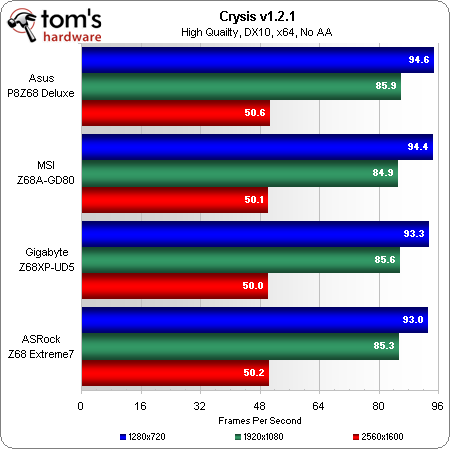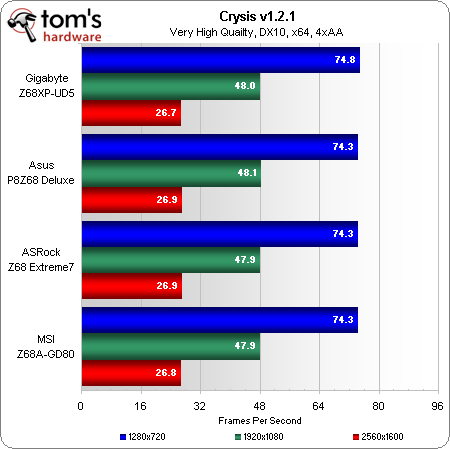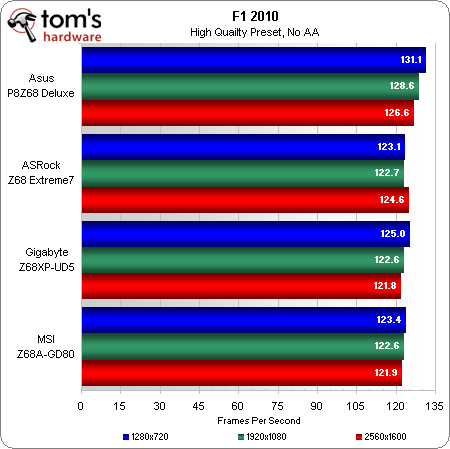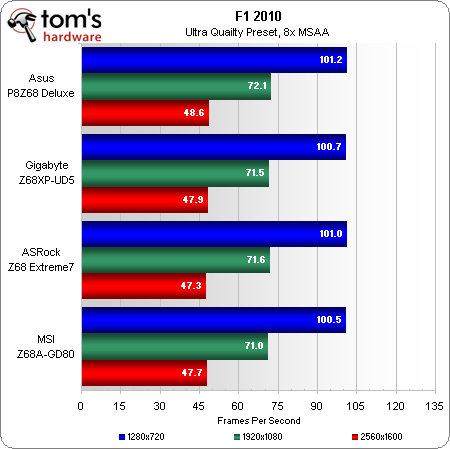Round-Up: Four Z68 Motherboards From $220 To $280
A real enthusiast chipset deserves a real enthusiast motherboard. Today we're comparing four feature-packed platforms that most folks who call themselves hardcore (and informed enough to know what hardware meets their needs) can actually afford.
Benchmark Results: Crysis And F1 2010
Crysis is a lot of fun for benchmarking, mostly because it’s the oldest game we can find that still causes new hardware to choke. It is, of course, a real game that a few people still play, so this is not a synthetic test in the literal sense.
We’re looking for noticeable differences, but find none in Crysis. What about F1 2010?
Asus’ P8Z68 Deluxe really rocks the F1 2010 benchmark. The explanation for this is relevant, since you'll see the company winning over and over in the benchmarks as a result.
In essence, any time you manually set a memory or BCLK setting in the P8Z68 Deluxe's UEFI (and this applies as far back as P67-based boards, according to Asus, though this is the first we've seen of it), the firmware engages an automatic rule that sets Turbo Boost to its maximum level across all cores, even when all four are active and you'd normally expect to see fewer bins of added frequency. This rule can be manually overridden in the UEFI if you want to cut power use. Or, if you set the BCLK and memory to be configured automatically, the rule is not applied. Asus says this is actually a feature of the processor architecture's microcode, if a vendor digs deep enough. It was first revealed by an Intel engineer and purportedly does not go against any of Intel's guidelines. Based on our results, it'd appear that Asus is currently the only company utilizing it.
The effects aren't all positive, though. As you'll see in the power measurements, consumption goes up faster than performance with this rule applied. The good news is that, again, if you want, you can work around it and drop performance and power use to match the other boards in our round-up at will.
Get Tom's Hardware's best news and in-depth reviews, straight to your inbox.
Current page: Benchmark Results: Crysis And F1 2010
Prev Page Test Settings And Benchmarks Next Page Benchmark Results: Just Cause 2 And Metro 2033-
RazorBurn Only Asus and AsRock for me.. Tried severals boards thru the years yet only this two has never failed me..Reply
My AsRock AliveNF6G-VSTA in my warehouse full of dust, mites, cobweb still works.. Recently upgraded to 4GB RAM and GTS 450 1GB video card.. -
iam2thecrowe i would like to see a more budget oriented roundup, not everyone wants to spend that much on a motherboard for 0.5 of an FPS increase, or overclock 100mhz more out of their cpu.....Reply -
beenthere Intel mobos are way over-priced IMO. In my many years of building PCs the only two mobos that I ever had fail were Asus. As far as performance and reliability I'd rank these mobo brands as follows:Reply
Gigabyte
MSI
Asus
Asrock -
flong I own the AsRock Extreme 4 Gen 3 board and it seems to be a very good board. I had the Asus Pro V before and had problems. I can say from experience that Asus's customer service is VERY poor to say the least. While their boards seem to be high quality according to most reviews, if you do have a problem don't count on Asus being around to help you out. I sent my board back to NewEgg and I had to argue with Newegg to get them to warranty it which was disappointing. Amazon does not have this problem and for my next motherboard purchase I will probably go through Amazon.Reply
The answer to my first email question to Asus came a three full weeks later AFTER I had decided to return the board. AND the answer was an absolutely stupid response that did not address the real problem. Still wanting an answer to my question, I clarified the question and sent it back to Asus again. TWO weeks later I got ANOTHER asinine response from them. At that point I realized I was wasting my time.
I don't know how good AsRock's customer service is since I have not had a problem with the board. -
Crashman iam2thecrowei would like to see a more budget oriented roundup, not everyone wants to spend that much on a motherboard for 0.5 of an FPS increase, or overclock 100mhz more out of their cpu.....I believe you missed this:Reply
http://www.tomshardware.com/reviews/z68xp-ud3-dz68db,2980.html
-
Mark Heath Reply
Crashman to the rescue again :)9519804 said:I believe you missed this:
http://www.tomshardware.com/reviews/z68xp-ud3-dz68db,2980.html -
Novuake Intel boards are not that bad, yes their Enthusiast boards are, but for a good while after LGA1155 came out they had the cheapest USB3/SATA 3 LGA1155 boards available, I think they still do... I would have to check.Reply -
Luay The Asrock Extreme7 belongs in another NF200 equipped Tri-fire/Tri-SLI round-up with the UD7, ROG and FTW boards, and I think it would still win based on value.Reply
Real enthusiasts, on the other hand don't use integrated graphics and already have a dedicated SSD. Enter P67 in the round-up and the winner would still be for almost 18 months running, the $255 Asus P67 WS Revolution.




